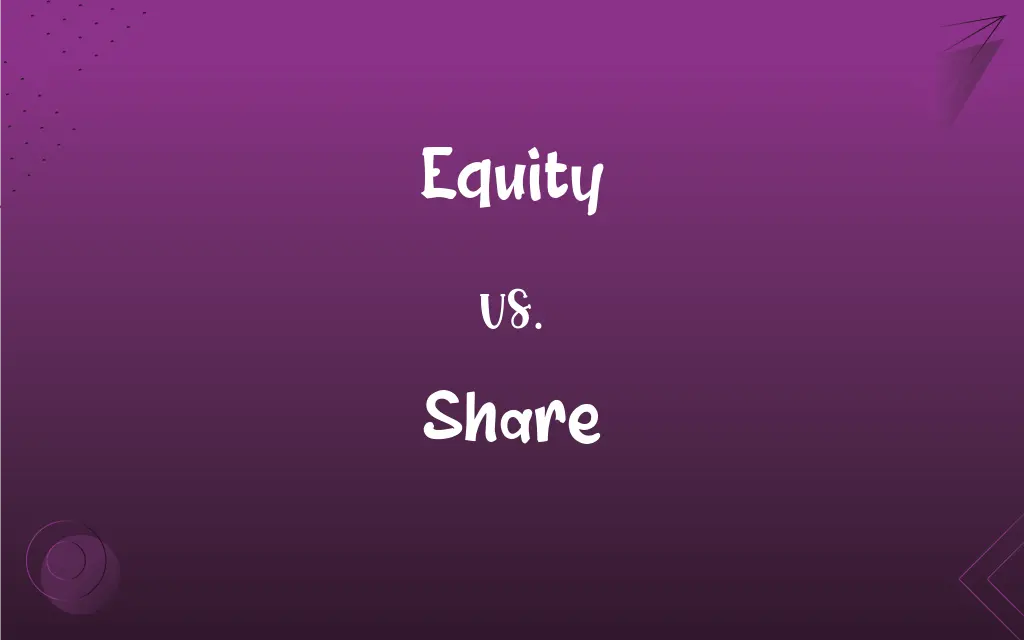Equity vs. Share: What's the Difference?
Edited by Aimie Carlson || By Harlon Moss || Updated on October 24, 2023
Equity represents ownership in a company; a share is a unit of that ownership.

Key Differences
Equity and share are terms often used interchangeably, but they have distinct meanings in the financial world. Equity broadly refers to the ownership value in an asset after liabilities have been subtracted. It encapsulates the net assets owned by shareholders. In contrast, a share is a specific unit of ownership in a corporation, representing a fraction of the company's total equity.
When someone says they have equity in a company, it implies they have an ownership interest, which could be due to shares they hold, investments they've made, or other forms of ownership. This ownership interest reflects the value they'd claim after selling assets and settling debts. On the other hand, when one possesses a share, it signifies holding a tangible portion of a company's stock, which has quantifiable value on the stock market.
It's crucial to note that equity can be derived from various sources and isn't confined to corporations alone. For instance, equity in real estate refers to the property's value minus any outstanding mortgage or debt. Shares are specific to corporations, representing standardized units of ownership, commonly traded on stock exchanges.
While both equity and share deal with ownership, their scope is different. Equity is a broader term that applies to the total ownership value, including all shares, retained earnings, and additional paid-in capital. A share, however, is just a piece of that pie, representing a fraction of the company's total equity.
Comparison Chart
Nature
Value of ownership
Unit of ownership
ADVERTISEMENT
Representation
Ownership after liabilities
Fraction of company's stock
Application
Can be in assets like real estate, businesses
Specific to corporations
Quantifiability
Reflects overall value
Has a specific market value
Scope
Encompasses all ownership assets and interests
Just a part of total equity
Equity and Share Definitions
Equity
Net value after deducting liabilities.
After settling the debts, the company's equity was still robust.
ADVERTISEMENT
Share
Entitlement to a portion of company profits.
Dividends are distributed based on the number of shares held.
Equity
Capital raised from shareholders.
The firm increased its equity to finance the new project.
Share
Tradable security on the stock market.
The price of a share can fluctuate based on market conditions.
Equity
Measure of ownership value in a business.
Investors look for companies with strong equity positions.
Share
Unit of ownership in a corporation.
He bought 100 shares of Apple Inc.
Equity
Interest or rights in a particular asset.
He holds a 10% equity in that startup.
Share
Evidence of investment in a corporation.
Holding shares in green energy companies is a sustainable investment.
Equity
Value of ownership in an asset.
Her equity in the house increased as property prices rose.
Share
Represents a fraction of a company's equity.
Each share represents a stake in the company's assets and earnings.
Equity
The state or quality of being just and fair.
Share
A part or portion belonging to, distributed to, contributed by, or owed by a person or group
The pirates argued over their shares of the treasure.
FAQs
Do shares always have a monetary value?
Yes, shares represent a quantifiable stake in a company and have market value.
Is equity always positive?
No, negative equity occurs when liabilities exceed the asset's value.
How is a share different from equity?
A share is a specific unit of ownership in a corporation, while equity represents the total ownership value.
Can equity exist without shares?
Yes, equity can be in assets like real estate, not just corporations.
What does equity refer to in finance?
Equity refers to the ownership value in an asset after deducting liabilities.
How are dividends related to shares?
Dividends are paid to shareholders based on the number of shares they hold.
Can equity change over time?
Yes, equity can fluctuate based on asset values and outstanding liabilities.
Can equity be negative in real estate?
Yes, if a property's mortgage exceeds its market value, it results in negative equity.
How can one increase equity in an asset?
Increasing the asset's value or reducing associated liabilities can boost equity.
Is equity tangible?
While equity represents value, it's a conceptual measure and not a physical entity.
How is equity calculated for businesses?
Business equity is calculated as total assets minus total liabilities.
How does raising capital affect equity?
Raising capital can dilute existing equity if done by issuing more shares.
Are all shares equal in value?
Not always. Companies can issue different classes of shares with varying rights and values.
Are shares a type of equity?
Shares are units representing a portion of a company's total equity.
Can one sell their shares anytime?
Shares traded on stock exchanges can be sold during trading hours, barring any restrictions.
Are shares and stock the same?
"Stock" refers to the overall ownership in a company, while "shares" are the units of that ownership.
Does having more shares mean higher equity?
Holding more shares increases one's proportionate ownership in a company's equity.
What denotes ownership in a corporation?
Holding shares in a corporation signifies ownership.
Do shares give voting rights?
Typically, shares grant voting rights, but it depends on the share class and company bylaws.
Is equity synonymous with net worth?
In many contexts, equity and net worth are used interchangeably, but their calculation might differ.
About Author
Written by
Harlon MossHarlon is a seasoned quality moderator and accomplished content writer for Difference Wiki. An alumnus of the prestigious University of California, he earned his degree in Computer Science. Leveraging his academic background, Harlon brings a meticulous and informed perspective to his work, ensuring content accuracy and excellence.
Edited by
Aimie CarlsonAimie Carlson, holding a master's degree in English literature, is a fervent English language enthusiast. She lends her writing talents to Difference Wiki, a prominent website that specializes in comparisons, offering readers insightful analyses that both captivate and inform.































































